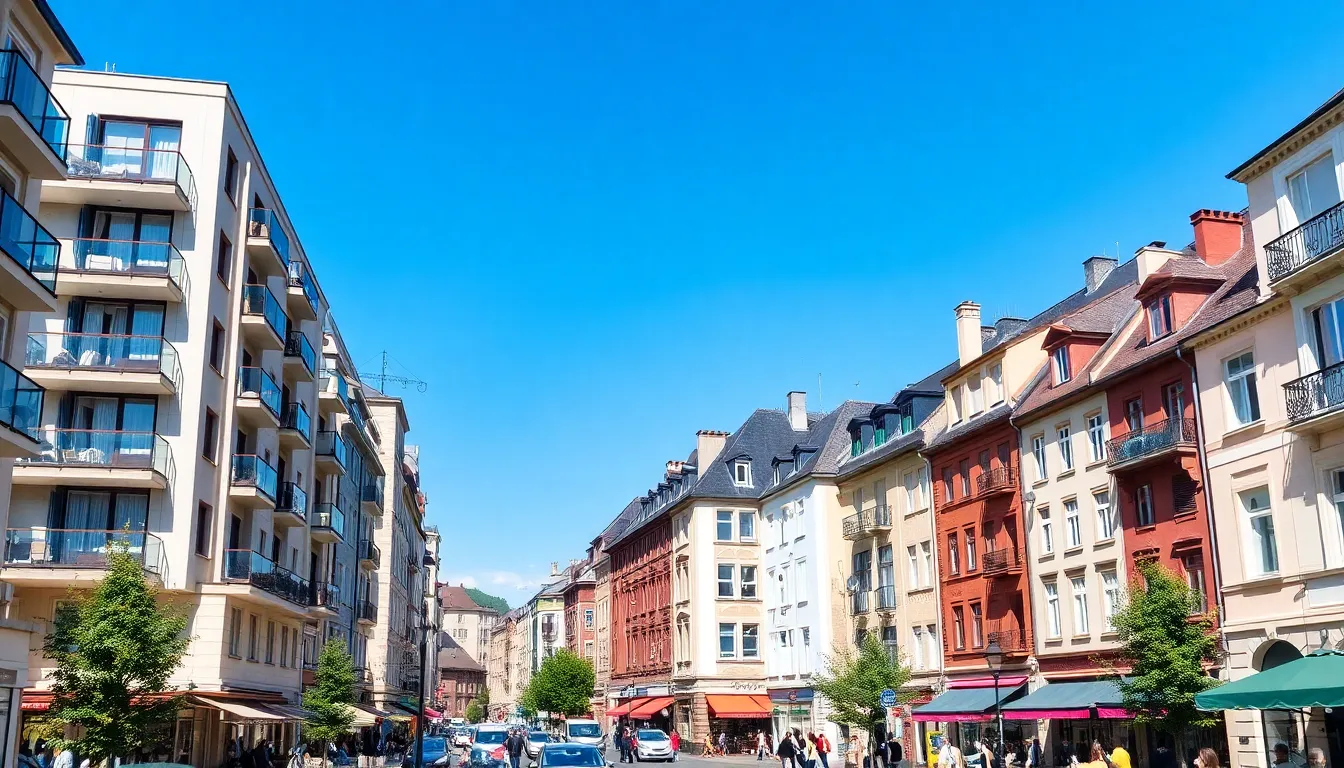Table of Contents
ToggleNestled between Belgium, Germany, and France, Luxembourg may seem like a tiny dot on the map, but it packs a punch when it comes to living costs. If you’ve ever wondered what it’s like to pay a premium for a croissant while surrounded by stunning castles, you’re in for a treat. This charming country offers a unique blend of high-quality living and wallet-busting expenses that can make even the most seasoned budgeter sweat.
From the price of a pint to the cost of a cozy apartment, understanding the cost of living in Luxembourg is essential for anyone considering a move or just dreaming of that fairy-tale lifestyle. Spoiler alert: it’s not for the faint of heart—or the faint of wallet! Dive into the details to discover whether this picturesque paradise is worth the splurge or if it’s time to pack those bags for a more budget-friendly destination.
Overview of the Cost of Living in Luxembourg
Luxembourg showcases a high cost of living, driven by various factors including housing and daily expenses. Housing ranks among the most significant costs. Renting a one-bedroom apartment in the city center typically costs around €1,500 monthly. Utilities, including electricity and water, add another €200 to €300 to monthly expenses.
Food expenses present another essential aspect. Dining out at a mid-range restaurant usually costs about €60 for two people. Groceries also tend to be expensive, with individuals spending around €300 to €400 each month on basic items like dairy, meat, and vegetables.
Transportation costs vary as well. Public transport remains efficient and affordable, with a monthly pass costing approximately €50. Owning a car incurs additional expenses, including fuel prices and insurance costs. Fuel prices often hover around €1.50 per liter.
Healthcare remains accessible and of high quality. Citizens benefit from a comprehensive health insurance system that covers a significant portion of medical expenses. Many residents pay around €100 monthly for health insurance.
Education costs align with housing and food as significant factors when moving to Luxembourg. International schools charge tuition fees ranging from €20,000 to €30,000 annually. Public schools offer free education, but many expatriates prefer private institutions.
Given these factors, individuals considering relocating to Luxembourg must assess their financial situations thoroughly. While the lifestyle may be appealing, expenses require budgeting and planning for sustainable living.
Housing Expenses

Housing expenses represent a significant portion of living costs in Luxembourg. Understanding these costs helps individuals prepare for financial planning.
Rental Prices
Rental prices in Luxembourg City often exceed typical European rates. A one-bedroom apartment in the city center averages €1,500 monthly. Founded on the location, pricing fluctuates between neighborhoods. For example, renting in areas like Bonnevoie or Limpertsberg tends to be more affordable at €1,200. Additional expenses include utilities, which generally add €200 to €300. Prospective renters should additionally consider security deposits usually equivalent to one or two months’ rent.
Purchasing Property
Purchasing property in Luxembourg also presents substantial financial demands. Average prices for apartments can reach €4,000 per square meter in central locations. Buyers should review various options, as regions outside the capital may offer lower prices, typically around €3,000 per square meter. Property taxes and notary fees, often totaling about 7% of the purchase price, factor into overall costs. With limited housing supply, securing a property often requires swift action, making it essential for buyers to stay informed on market trends.
Transportation Costs
Transportation in Luxembourg is relatively affordable and offers various options for residents.
Public Transportation
Public transportation includes buses, trams, and trains. A monthly pass costs around €50, providing unlimited access to the entire network. Services run frequently, making commuting convenient. Many citizens rely on public transport for daily travel. The country’s commitment to sustainability is evident since public transport became free in 2020. Overall, efficient transit systems contribute to lower costs for daily commuting.
Car Ownership
Car ownership entails higher expenses. Monthly parking fees in city centers can reach €200. Fuel prices fluctuate but typically hover around €1.50 per liter. Insurance costs for vehicles average €100 monthly. Maintenance and repair expenses add to the overall cost, which can vary based on the vehicle’s condition. Some residents prefer cars for convenience, especially in less accessible areas. Budgeting for these costs is essential for those looking to own a vehicle in Luxembourg.
Food and Grocery Prices
Food and grocery prices in Luxembourg play a crucial role in the overall cost of living. Dining out and grocery shopping significantly impact budgets.
Eating Out
Dining at restaurants can quickly add up. A mid-range restaurant typically charges about €60 for a meal for two. Fast food options also exist, but meals there can still cost around €10 per person. The price of drinks, especially alcohol, increases the overall dining cost. Additionally, fine dining establishments charge considerably more, often exceeding €100 for two. Individuals should plan for these expenses when considering meals out.
Grocery Shopping
Monthly grocery expenses range from €300 to €400 per household. Basic items like bread, milk, and eggs are available, though prices may vary slightly between stores. A liter of milk costs around €1.20, while a loaf of bread usually runs about €2.90. Fresh produce also figures into shopping budgets, with fruits and vegetables priced between €2 and €4 per kilogram. Shoppers should consider discounts and loyalty programs to manage these costs effectively.
Healthcare and Insurance
Healthcare in Luxembourg is both accessible and of high quality. Residents typically pay around €100 monthly for health insurance. This cost covers most essential medical services, ensuring that individuals receive necessary care without financial strain. The healthcare system is known for its efficiency, with numerous hospitals and clinics available across the country.
Insurance requirements differ based on employment status. Employees automatically receive health insurance through their employer. For self-employed individuals, securing private health insurance becomes essential to access similar coverage. The comprehensive nature of the system alleviates concerns about out-of-pocket expenses for common medical treatments.
Prescription medications are generally affordable, with prices significantly lower than in some neighboring countries. Reimbursements for prescribed treatments often cover up to 80% of costs, depending on the specific medication and circumstances. Preventive care services, including vaccinations and regular check-ups, are also typically covered, promoting wellness among residents.
Emergency healthcare services maintain a high standard. Waiting times in hospitals tend to be minimal, allowing for prompt treatment. Access to specialists is straightforward, with referrals typically not required for initial consultations.
When planning for healthcare expenses, individuals should consider additional insurance options. Options exist that cover private room accommodations in hospitals and alternative treatments. While basic health insurance provides substantial coverage, supplemental policies may enhance benefits for those seeking more personalized care.
Overall, navigating the healthcare landscape in Luxembourg proves manageable for residents. Costs remain reasonable compared to many other European countries, contributing positively to the overall cost of living experience.
Education Expenses
Education costs in Luxembourg present a notable factor for families. International schools charge significant tuition fees, typically ranging from €20,000 to €30,000 annually. These institutions often provide curricula aligned with different educational systems, including British, American, and international baccalaureate programs. Public schools, however, offer free education, making them an attractive option for residents.
Most public schools encompass Dutch, French, and German instruction, catering to the diverse population in the country. In addition to tuition, families ought to consider additional expenses like books, supplies, and extracurricular activities which can add up over the school year.
Childcare costs represent another consideration. Nurseries and daycare facilities typically charge between €600 and €1,200 monthly, depending on the location and services offered. Parents often seek subsidies or financial assistance to offset these costs, particularly for lower-income families.
Transportation expenses can also affect education budgets. Students using public transport benefit from subsidized rates, often paying around €25 monthly for a student pass.
Families relocating to Luxembourg must prioritize education expenses in their overall budget strategy. Proximity to schools often influences housing decisions, as neighborhoods with established international schools can have higher rental prices. Assessing educational options ahead of a move can aid in making informed financial decisions, ensuring families align their budgets with their educational goals.
Living in Luxembourg offers a unique blend of culture and lifestyle but comes with a significant financial commitment. From housing and food to transportation and healthcare, the costs can add up quickly. While the country boasts excellent public services and a high quality of life, individuals and families must approach their budgeting with care. Those considering a move should weigh their financial readiness against the appealing aspects of life in this vibrant nation. With thoughtful planning and a clear understanding of expenses, it’s possible to enjoy all that Luxembourg has to offer while managing costs effectively.







